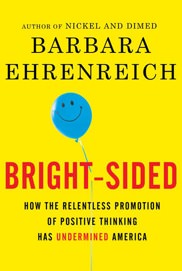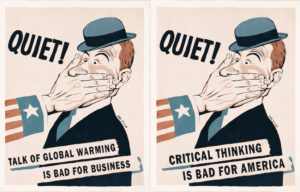Carol Tavris on Barbara Ehrenreich’s Crusade
In her recent book, Barbara Ehrenreich takes on the excesses, delusions and unsupported promises of the positive-thinking movement, tracking both its naive and its corrupt manifestations in the worlds of health, business, religion and psychology.In her recent book, Ehrenreich takes on the excesses, delusions and unsupported promises of the positive-thinking movement.
This review originally appeared in The TLS, whose website is www.the-tls.co.uk, and is reposted with permission.
Barbara Ehrenreich’s essay about her experience of breast cancer, published in Harper’s in 2007, was like a bracing blast of clean, cool air in a musty room. Her article was not about her medical treatment but about the infantilizing breast-cancer-survivor industry, with its pink ribbons, teddy bears and relentless cheerfulness. You may not call yourself a victim or a patient; you must see yourself as a “survivor”. You must not be angry or raise political questions about the dismal state of health care in America, or the possible environmental causes of cancer. You must not whine or cry, because negative emotions and attitudes are not only a sign of psychological defeat, but also a sure way to make the cancer return or grow faster. If it does return, it is your fault for not being positive enough and thinking the right thoughts. Ehrenreich is furious at the burden that this erroneous belief places on patients, and quotes one woman’s statement: “I know that if I get sad, scared or upset, I am making my tumor grow faster and I will have shortened my life”. Smile or die, indeed.
Barbara Ehrenreich has long been a tireless fighter against the purveyors of silliness and self-deception who clog America’s airwaves and bestseller lists, and she reserves her special venom for those who profit by taking advantage of the poor, the unemployed, the uninsured. In books such as Nickel and Dimed: On (not) getting by in America (2002) and Bait and Switch: On the (futile) pursuit of the American dream (2006), she reminded readers to ask who it is that benefits when Americans who are struggling financially are advised to solve their problems by wishing harder and praying more. In Smile or Die (which is published in the US under the title Bright-Sided: How the relentless promotion of positive thinking has undermined America), she takes on the excesses, delusions and unsupported promises of the positive-thinking movement, tracking both its naive and its corrupt manifestations in the worlds of health, business, religion and psychology.
Bright-sided: How the Relentless Promotion of Positive Thinking Has Undermined America
By Barbara Ehrenreich
Metropolitan Books, 256 pages
“Positive thinking” is the shmoo of American culture: an irresistible target that invites mockery but is impossible to eradicate. (The shmoo, a cartoon character invented by Al Capp in 1948, would do anything to make you happy, absorb any abuse you cared to hurl at it, and then, if you were hungry, turn itself into a nice steak dinner for you.) Ehrenreich examines the rise of positive thinking from its inception in the nineteenth century, where it began as a revolt against Calvinism’s doctrine of hard work and eternal damnation. Mary Baker Eddy’s invention of Christian Science, allied with Phineas Quimby’s New Thought movement, held that illness was all in the mind, and therefore a mind cure was better than a medical one. (In many cases, given the state of medicine at the time, it was.) What Mary Baker Eddy was to the nineteenth century, Norman Vincent Peale was to the twentieth; his The Power of Positive Thinking in turn spawned legions of bestsellers, such as Rhonda Byrne’s The Secret (2006), whose secret is that if you are poor, unhappy, or jobless, the fault lies not in your stars or your circumstances but in your thoughts.
What a welcome message for companies busily laying off employees! Between 1981 and 2003, some 30 million full-time American workers lost their jobs as corporations downsized. As that happened, Ehrenreich argues, positive thinking became a big business, and big business was its principal client. Corporations, having no safety nets to offer their laid-off workers, offered psychological cheerleading instead: how better to manage workers’ despair and head off anger than by hiring motivational speakers to give them pep talks about all the new opportunities they now had? Don’t be angry at your boss or blame the system, one Christian motivational speaker, Zig Ziglar, advises, “work harder and pray more”. Corporations bought the message of positive thinking themselves, too: “Why bother worrying about dizzying levels of debt and exposure to potential defaults”, Ehrenreich writes, “when all good things come to those who are optimistic enough to expect them?”. Ehrenreich knows that the economic collapse that struck America has many complex causes, but she argues that positive thinking paved the road to disaster as American corporate culture replaced “the dreary rationality of professional management” with cheery expectations of ever-greater success. They were victims of the same delusional thinking they sold to their workers: wishing will make it so.Ehrenreich is at full speed by the time she takes on positive psychology, a movement within academic psychology that investigates “the science of happiness”. She interviews one of the founders of the movement, Martin Seligman (an eminent professor at the University of Pennsylvania), who, perhaps aware of her scepticism, does his best to elude her probing questions. Ehrenreich gives him a hard time about his “Authentic Happiness” questionnaire, on which she scored a “less-than-jubilant 3.67 out of 5”, mostly because she didn’t feel “extraordinarily proud” of herself and confessed to being pessimistic about the future – “assuming that it was the future of our species at issue, not just my own”. Unlike many of the reporters who have interviewed researchers in the positive psychology field, Ehrenreich has done her homework, examining the data beneath the claims that are made and learning that many of them are tenuous or wrong. Optimism does not prolong life. Support groups do not affect the course of cancer. Among older people who lose a loved one, pessimists are less likely to become depressed than optimists. People who are grumpy and neurotic “do more complaining about angina but are at no greater risk of pathology than cheerful people”. Happy people do not have “feistier immune systems than less happy people”, as Seligman has stated. Many of the researchers in this field are careful in their professional writings, for example by noting, as one team did, “serious conceptual and methodological reservations” about the literature on positive emotions and health, the “inconsistent” findings, and even the “potentially harmful” effects of some of the research. Yet when most of them speak to reporters or to a general audience, or write popular books, they admit that they often get “ahead of the science”. They oversimplify, smoothing away the inconsistencies and negative findings. (Both the media and the major funder of research in positive psychology, the conservative Templeton Foundation, want positive results about positive thinking.) Seligman says that within a decade “we’ll have self-help books that actually work”. Given that he has already written one, this curious remark suggests he is practising some positive thinking himself.
Bright-sided: How the Relentless Promotion of Positive Thinking Has Undermined America
By Barbara Ehrenreich
Metropolitan Books, 256 pages
Ehrenreich may be forgiven for not knowing the origins of positive psychology within the field, but Seligman and his colleagues should know better. They rarely acknowledge their debt to Abraham Maslow and Carl Rogers, who, in the 1960s, argued that it was time for a “third force” in American psychology – humanism, an alternative to then dominant world-views of psychoanalysis and behaviourism. Humanists wanted psychologists to pay more attention to the positive aspects of life, including joy, humour, love and the rare moments of rapture caused by the attainment of excellence or the experience of beauty. The humanists were not scientists themselves, but they spurred research on such admirable attributes as empathy, courage, resilience, altruism, the motivation to excel and self-confidence. This was the kind of positive psychology Ehrenreich would welcome; as her own book Dancing in the Streets: A history of collective joy suggests – she is certainly not opposed to joy.
Like all warriors with a take-no-prisoners approach to a problem, however, she occasionally sweeps some innocent civilians into her net. For one thing, the basic premiss of “positive thinking” is neither new nor American: the Stoic philosophy that negative, destructive emotions are created by our thoughts and errors of judgement flourished 300 years bc. The modern practice of cognitive behavioural therapy is based on this notion, and it has been supported by hundreds of empirical studies. Further, decades of research in social psychology have shown that the attitude Ehrenreich finds so saccharine and typically American – the remarks that many cancer patients make to the effect that “I’m a different and better person now” – reflects a universal human need to make sense of negative experiences.
But what is uniquely American is the way that motivational entrepreneurs, religious hucksters and psychologists who are willing to jump “ahead of the science” have packaged and sold positive thinking as a commodity, as if it were a tonic that can bring us safety, security and health all on its own. “The threats we face are real and can be vanquished only by shaking off selfabsorption and taking action in the world”, Ehrenreich writes. And that requires thinking critically as well as positively, as this fine book exemplifies.
|
Carol Tavris is the co-author (with Elliot Aronson) of “Mistakes Were Made (but Not by Me): Why We Justify Foolish Beliefs, Bad Decisions, and Hurtful Acts,” which appeared in paperback in 2008. |
Independent journalism is under threat and overshadowed by heavily funded mainstream media.
You can help level the playing field. Become a member.
Your tax-deductible contribution keeps us digging beneath the headlines to give you thought-provoking, investigative reporting and analysis that unearths what's really happening- without compromise.
Give today to support our courageous, independent journalists.






You need to be a supporter to comment.
There are currently no responses to this article.
Be the first to respond.